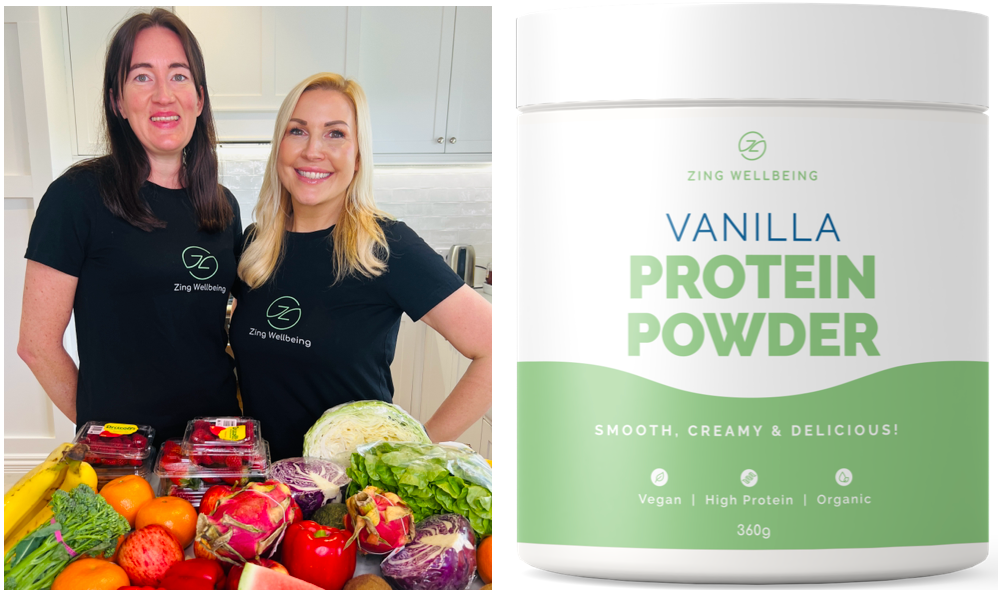
Nutritionist advises how to find a good protein powder
Mel Larkings is one our our Zing Wellbeing Nutritionists and today Mel is talking about how to find a good protein powder.
It can be hard to find a good protein powder - so thank you Mel for talking to us.

How to find a good protein powder
Finding a good protein powder can be like finding a needle in a haystack.
With all the different kinds, colours, flavours and superb marketing it can be difficult to determine a simple, good quality protein powder which is free from artificial flavours, colours and sweeteners.
When it comes to protein powder there are several different types to be aware of including:
- Whey protein - which comes in whey protein concentrate (WPC) and whey protein isolate (WPI)
- Casein protein
- Soy protein
- Brown rice protein
- Pea protein
- Hemp protein
- Egg white protein
- Collagen protein
This list alone shows the diversity of available proteins and then each will have various blends, added ingredients which may include digestive enzymes, different flavours and so on.
Plus, there are blends of different types of proteins such as brown rice and pea.
Choosing a protein can seem overwhelming with all this going on however, as a nutritionist we tend to look for a pure, vegetable based protein powder with no additives, which also tastes great!
With all this in mind pea protein tends to be the recommendation, however, not all pea proteins are even created equal.
It is important to read the ingredient listto ensure there are no nasties in your protein.
Why pea protein powder?
First and foremost – pea protein powder delivers a high protein content which is from a vegetable source, not animal.
Pea protein provides about 25 grams of protein per serving. It is a complete protein, meaning it contains all nine essential amino acids, though it is lower in methionine compared to animal-based proteins.
Being plant based as opposed to animal based (such as whey) means that pea protein is highly digestible and generally well-tolerated by those with sensitive stomachs or digestive issues.
It is also hypoallergenic and free from common allergens like dairy, soy, and gluten, making it a good option for individuals with allergies or intolerances. Pea protein is kinder to our elimination organs than whey based proteins as it is gentler on our kidneys and liver.
It also means that pea protein is more sustainable than animal sourced proteins. Peas are a more environmentally friendly crop compared to animal-based proteins. They require less water and land and produce fewer greenhouse gases.
Pea protein will support muscle growth and repair, similar to other protein sources, which is beneficial for athletes and those engaged in regular physical activity. This may also aid in weight management by promoting satiety and helping with appetite control, which can lead to reduced calorie intake.
Pea protein is great for our heart! It may help lower blood pressure and improve cardiovascular health due to its potential to increase levels of arginine, an amino acid that promotes blood vessel dilation.
It’s not just protein – peas are nutrient-rich and its protein often contains additional nutrients like iron, magnesium, and potassium, which contribute to overall health.
When looking for a good quality protein powder there should not really be any other ingredients than those you recognise as food.
Certainly, no numbers, or natural identical flavours and definitely no artificial sweeteners which has been linked to digestive complaints, microbiome issues and even concerns about long term health effects.
Zing Wellbeing Pea Protein Powder
And I am impressed with the Zing Wellbeing protein powder - and I am happy to report that when I tasted it, it tasted smooth, creamy and not gritty at all

Ingredients that we love:
- Certified Organic Pea Protein - pure, organic and high protein
- Certified Organic Cocoa Powder – among the highest of magnesium foods in the world this will deliver a delicious chocolate flavour. It is also full of antioxidants called flavonoids which help reduce oxidative stress and inflammation, assist with endothelial function and promote vasodilation, and enhance cognitive function.
- Himalayan Pink Salt – A natural salt which is important due to the additions of nasty chemicals and bleaching that can be found in your average table salt. Pink salt helps to balance electrolytes in the body so that you hydrate better while providing a huge array of micronutrients. It also has healing properties and is known for its effect on allergies, sinus and asthma. It aids in nutrient absorption and helps to reduce fluid retention, and maintains an acid-alkaline balance in the body. Plus, it contains over 84 minerals!
- Thaumatin – is a natural sweetener derived from a plant and known as one of natures most potent sweeteners. It is around 3,000 times sweeter than sugar, which means only a little is needed. Unlike table sugar, thaumatin has minimal impact on blood sugar levels, is calorie-free, does not cause tooth decay and even has some antioxidant properties!
Overall, pea protein is a nutritious, easy to digest, protein-rich, plant-based and eco-friendly way to add additional protein to your daily diet.
It is also super versatile and easy to incorporate in cooking or as a simple shake.
See the organic protein powder here


